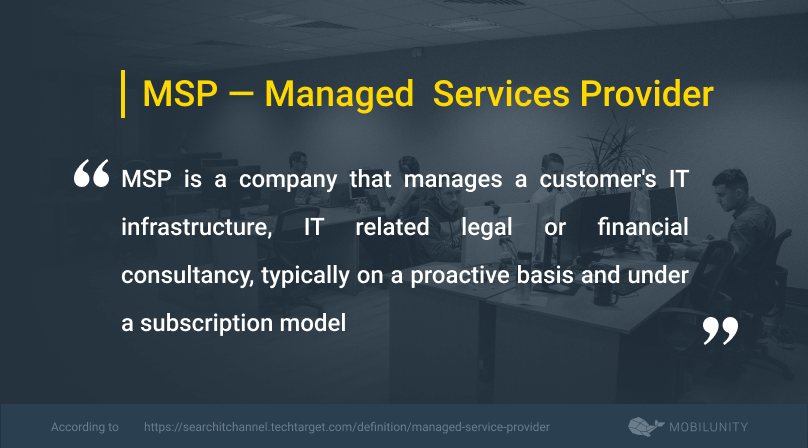MSP (Managed Services Provider)
Managed Services Provider Definition
According to Gartner[1], the world’s leading research company, MSP (Managed Services Provider), can be defined as a company that delivers services such as infrastructure, network, security and application by meeting the most accurate customer needs. An MSP provides mainly managed IT services but it can deliver IT related legal and financial consultancy as well.

History of MSP
At the very beginning, managed it services companies acted mostly as system builders or IT integrators and resellers. It’s during the 1980s and 1990s[2] when some IT firms started to differentiate themselves from other IT actors by adding “extra” services. Traditionally, MSP meaning was related to infrastructure or end device types of services: small local firms reselling big companies IT products and services (IBM, HP, Dell, etc), and aiming to maximise their profit margins.
But in order to maintain a sustainable profit, resellers and IT integrators expanded their activities and added value to their way of doing things: they offered to install and troubleshoot solutions themselves for their clients and included IT management, periodic maintenance and support services. After 2000, the answers to what is managed IT services and what is a managed service provider becomes clearer. The emergence of Internet speed has made it possible to centralize data and monitor the whole infrastructure remotely, which is exactly what an MSP does.
How Does MSP Work?
As mentioned before, MSP is a sort of a third-party that acts in the IT industry and provides managed IT services to customers, whether they are professionals or individuals. It defines structured management services to its customers. It uses strategic methods to improve operations for small and medium-sized businesses, as well as large corporations, governments and non-profit organizations. An MSP can handle complex operational tasks that the customer doesn’t have to deal with directly and can be very critical to his business success. It is becoming a part of the making of strategic decisions to outsource operational processes, and taking advantage of the MSP expertise.
Most of the work is done automatically and remotely, far from the customer’s IT infrastructure. The customer has to purchase the service that meets his standards, often found or formulated under a subscription model. Nowadays, it’s impossible to separate “managed service provider” and “cloud service provider”, especially when the provider’s service is delivered to the customer over the internet and supported by a service level agreement (SLA).
Managed Services: Why Use Them?
It’s mainly the lack of IT material capabilities and expertise that drives a lot of small and medium-sized businesses (SMBs) to call out MSP for help. But, larger organisations may get their IT services externally managed too, due to budget limitations that impact hiring qualified IT staff, so the organisation finds itself obligated to delegate some or all of their IT operational processes to MSP and get benefits of managed IT services.
The costs of managed services are predictable since the customer sets an agreement with the MSP, whether on the ongoing term or occasionally. Besides, training and getting staff certified for technology can be a real burden for some businesses. This is why engaging managed services provider staffing is a winning deal. The customer gets help from a dedicated, qualified, certified and experienced team specific to its business field. By this, there is no need to search and hire a full time IT staff.
What to Outsource to an MSP
Outsourcing managed services offer saving time and money and make it easy to focus on the core business: administrative, financial work, strategic plans, business evolution. In order to bring great value and help organisations grow and succeed, the need to call for MSP services as an extension to the inhouse staff becomes a meaningful thing.
MSPs act in different sector activities. Some may specialize in particular fields of IT such as data storage, remote security administration, communication and collaboration, network infrastructure. Others may focus on specific markets, like financial services, aviation industry, healthcare, legal services, or have diversified portfolios and work with different sectors. By delegating IT services to MSPs, companies reduce large capital expenses spent on various in-house IT tasks and add little to no value to your business. The areas of business[3] that are most often outsourced to MSP services can be:
An Overview of The Managed Services Market
The need for managed services has evaluated significantly throughout time. Increasing investment and IT innovations have led to a growing worldwide market. Let’s take North America, for instance. It’s always been estimated to have the largest market share since the very first expansion of the MSP definition. The US and Canada are leading the area due to the important number of active and diverse MSPs.
With the emergence of IT investment in Asia[4], and especially in cloud-based solutions network monitoring and data protection, the region is expected to fulfill the demands for managed services not only regionwide but also worldwide. China, India, and Russia lead the managed services growth increasing their investments in MSPs. Some countries, like Ukraine are trying to catch the queue and make their way in the MSP Market.
Benefits and Limitations of MSP
It is known that managed services greatly impact cost savings due to the way MSPs handle things. Most of them work under a subscription model and set SLAs with their customers. This means that the fees will be well traced and controlled. The monthly or yearly costs are very predictable. Additionally, MSP is armed with strong knowledge and expertise in the IT field. This will help organisations to overcome the need for hiring and periodically training full time staff. Above that, MSP can be a very useful source of reliable information that helps business owners in the decision-making process.
Yet, MSPs may face financial challenges since they act pretty much like resellers but with an added value. They must always figure out how to maintain healthy margins and grow their profits.
A Full Time IT Staff or an IT Managed Services Provider?
Hiring a full time IT staff might seem a good idea at first. Nothing compares with having a Superman willing to figure out solutions for every problem. But in the IT field, hiring a Superman that can do Network administration, data protection, data storage, printers management is very pricy, not to mention irrational. Once a network is up, it works until one day a problem occurs and needs to be fixed. This is why delegating IT services to MSPs is a cost-effective way to handle things and gain time and energy. Organisations must focus on their core business and develop their activities with minimum concerns.
See Also
References
01. https://www.gartner.com/en/information-technology/glossary/msp-management-service-provider
02. https://www.endsight.net/blog/what-is-an-msp
03. https://www.sba.gov/blog/10-small-business-functions-can-be-easily-outsourced
04. https://www.marketwatch.com/press-release/managed-services-market-2020-2022-trends-market-share-growth-opportunity-2020-08-10?mod=mw_quote_news


